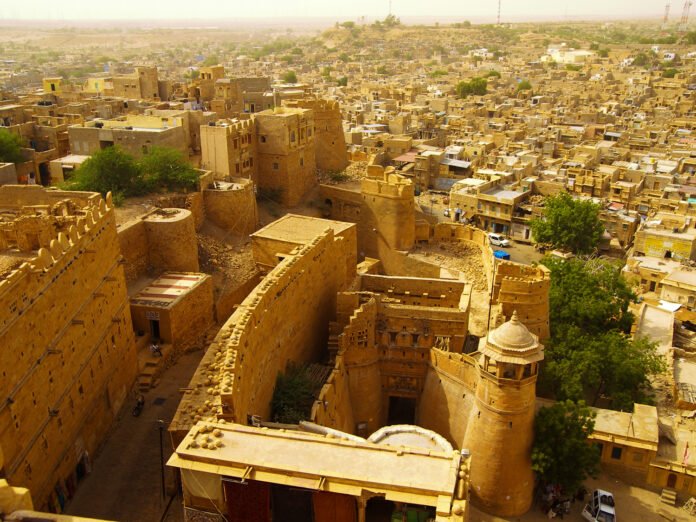Jaisalmer, often referred to as the “Golden City,” is a mesmerizing destination nestled in the heart of the Thar Desert in Rajasthan, India. This enchanting city is renowned for its rich cultural heritage, which is beautifully reflected in its architecture, traditions, and vibrant local life. Visitors are drawn to Jaisalmer not only for its historical significance but also for the unique experiences it offers, such as staying in a desert camp in Jaisalmer. Let’s delve into the fascinating aspects of Jaisalmer’s cultural heritage that make it a must-visit destination.
The Majestic Jaisalmer Fort
Standing tall and proud, the Jaisalmer Fort is one of the largest forts in the world and a UNESCO World Heritage Site. Built in 1156 AD by Rajput ruler Rawal Jaisal, the fort is a stunning example of yellow sandstone architecture, giving it a golden hue under the sun, which is why Jaisalmer is often called the “Golden City.” The fort’s intricate carvings, grand gateways, and winding lanes transport visitors back in time, offering a glimpse into the opulent lifestyle of the Rajput rulers.
Havelis: Mansions of the Wealthy Merchants
Jaisalmer is home to some of the most exquisite havelis, or traditional mansions, built by wealthy merchants in the 19th century. Patwon Ki Haveli, Nathmal Ki Haveli, and Salim Singh Ki Haveli are among the most famous. These havelis are adorned with intricate carvings, beautiful frescoes, and elaborate balconies. Each haveli tells a story of its own, reflecting the prosperity and artistic sensibilities of its owners. A visit to these havelis offers a deeper understanding of the architectural prowess and cultural richness of Jaisalmer.
Desert Culture and Traditions
The Thar Desert has played a significant role in shaping the culture and traditions of Jaisalmer. The city hosts various festivals and fairs that celebrate its desert heritage. The Desert Festival, held annually in February, is a vibrant extravaganza featuring folk dances, music, camel races, and traditional crafts. It provides a perfect opportunity for visitors to immerse themselves in the local culture and witness the desert’s unique way of life.
Folk Music and Dance
Folk music and dance are integral to Jaisalmer’s cultural heritage. The city’s music is characterized by the soulful tunes of the Sarangi, a traditional string instrument, and the rhythmic beats of the Dholak. Rajasthani folk dances like Kalbeliya and Ghoomar are performed with great enthusiasm and grace. These performances are often part of the evening entertainment at various desert camps and hotels, providing a magical experience under the star-lit desert sky.
Local Cuisine: A Gastronomic Delight
Jaisalmer’s culinary heritage is as rich and diverse as its culture. The local cuisine is a delightful blend of flavors, with dishes like Dal Baati Churma, Gatte Ki Sabzi, and Ker Sangri taking center stage. The use of locally sourced ingredients and traditional cooking methods gives the food an authentic taste that is hard to find elsewhere. Visitors can savor these delicacies at local eateries and also enjoy traditional Rajasthani thalis at various restaurants across the city.
Traditional Crafts and Handicrafts
Jaisalmer is renowned for its traditional crafts and handicrafts, which are a testament to the city’s artistic heritage. The local markets are brimming with beautiful textiles, embroidered fabrics, leather goods, jewelry, and pottery. The intricate designs and vibrant colors of these crafts reflect the skilled craftsmanship of the local artisans. Shopping for these handicrafts not only supports the local economy but also allows visitors to take home a piece of Jaisalmer’s cultural heritage.
The Charm of Desert Camps
For an authentic desert experience, staying in a Swiss tent in Jaisalmer is highly recommended. These desert camps offer luxurious accommodations amidst the serene desert landscape. Guests can enjoy traditional Rajasthani hospitality, partake in camel safaris, and witness mesmerizing sunsets over the dunes. The camps also organize cultural performances, giving visitors a chance to experience the local traditions and folklore up close.
Jain Temples: A Spiritual Haven
The Jain temples of Jaisalmer are another significant aspect of the city’s cultural heritage. Located within the Jaisalmer Fort, these temples date back to the 12th and 15th centuries and are dedicated to various Jain Tirthankaras. The temples are renowned for their exquisite architecture, intricate carvings, and serene ambiance. A visit to these temples offers a spiritual experience and a glimpse into the religious diversity that has shaped Jaisalmer’s history.
Camel Safaris: An Unforgettable Adventure
No trip to Jaisalmer is complete without embarking on a camel safari. These safaris offer a unique way to explore the vast Thar Desert and experience the nomadic lifestyle of the desert dwellers. Riding a camel through the golden sands, witnessing the changing colors of the desert at sunset, and spending a night under the stars at a desert camp are experiences that leave a lasting impression on every traveler.
Conclusion
Jaisalmer’s rich cultural heritage is a tapestry of history, traditions, art, and hospitality. From its majestic fort and havelis to its vibrant festivals and desert camps, the city offers a myriad of experiences that captivate the hearts of visitors. By exploring Jaisalmer’s cultural heritage, one not only gains insight into the glorious past of Rajasthan but also becomes a part of the living traditions that continue to thrive in this enchanting city. Whether you are a history enthusiast, a culture lover, or an adventure seeker, Jaisalmer promises an unforgettable journey into the heart of Rajasthan’s heritage.



